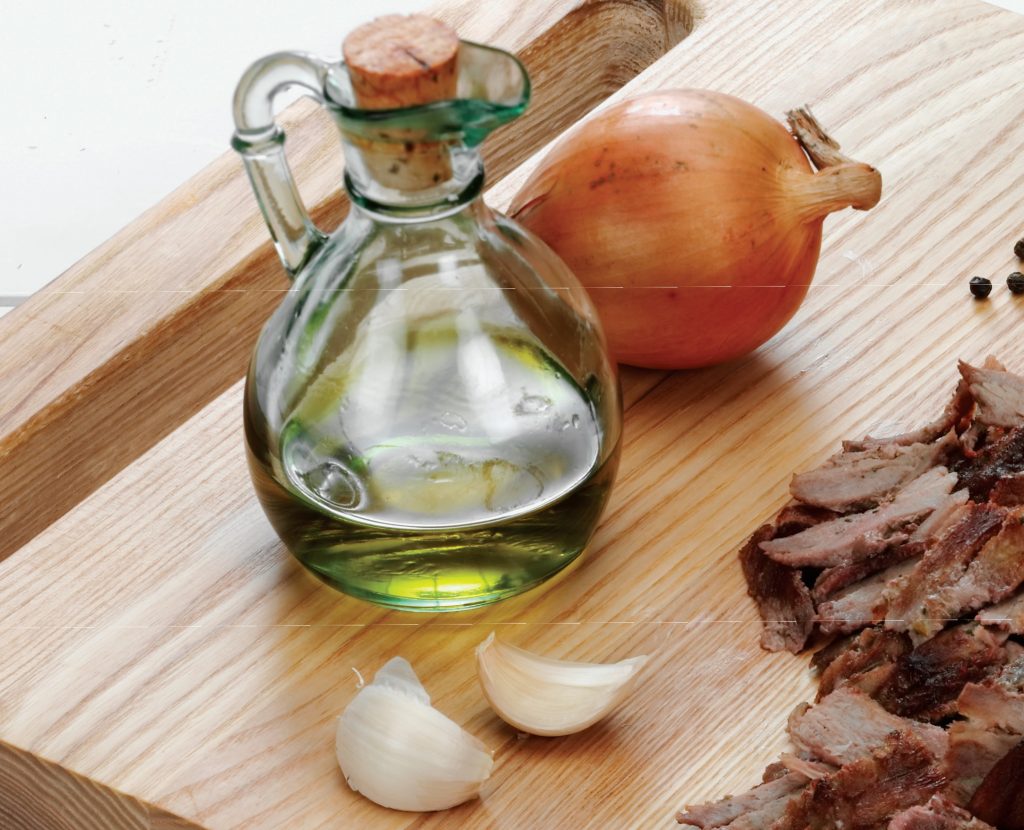The Merger of Two Gyro Titans
Posted by estiator at 16 April, at 08 : 53 AM Print

TOGETHER AT LAST, GRECIAN DELIGHT AND KRONOS CHART A COURSE FOR THE GREEK STREET-FOOD STAPLE—AND BEYOND. By Constantine N. Kolitsas
What was once for many Americans outside of Greek enclaves a curiosity festival item has, over the past decade or so, become a culinary juggernaut. Gyro is, today, a street food that is popular throughout the country, and throughout the world. The big gyro companies, largely based in Chicago, have been steadily expanding their product portfolios beyond the Greek rotisserie favorite and its ancillary accoutrements (think pita, tzatziki, hummus, and the like), and into areas that include gyro’s ethnic cousins (shwarma, al pastor, and carne asada, for example) and plant-based proteins. The recent acquisition and merger of two of the category’s largest players, then, is big news. Estiator caught up with Peter Parthenis Jr., the CEO and president of the company: a marriage between his family’s Grecian Delight and erstwhile rival Kronos.
Estiator: For many, the merger between Grecian Delight and Kronos last year came as something of a surprise, but in your press releases it seems as though this is something that has been in consideration for some time.
Peter Parthenis Jr: You’re correct; it’s been a life-long dream of my family and mine to merge Kronos with Grecian Delight. My father founded Grecian Delight about a year before Chris Tomaras started Kronos, and the two competed against one another, along with some of the other companies, which all began operating in the mid-’70s. About 20 years ago, Chris Tomaras sold Kronos to a private equity firm and since, it has been sold again and again; probably every five years so. Every single time it’s gone up for sale, we’ve been at the table, trying to acquire it. So, there’ve been multiple attempts to buy it, beginning with when the founder owned it, and afterward.
What was different about this attempt, and how did the deal happen?
Each time that Kronos went on the market, it was a private equity firm that always came out ahead in the process. These firms offer a great deal of credibility that they will close the deal. This time, I brought in Entrepreneurial Equity Partners (E2P), a private equity firm, as a partner to accomplish this goal. It’s because we partnered with E2P that we had the opportunity to merge these businesses.
What has the merger meant from a management standpoint?
We’re about halfway through the integration between the two companies. I’m a big believer that the management positions will go to those with the best talents. From the beginning, our first conversation with the management team was that egos will be set aside and those with the best talent will win the role. Almost a year into the merger, the management team is balanced about 50/50 between the Grecian Delight and Kronos teams. Together we’re stronger. It’s not who was the best company; it’s about which individuals had the best talent.
What does the merger mean for your customers?
In bringing Grecian Delight and Kronos together we are able to provide our customers with more solutions. It’s now a one-stop-shop for Mediterranean food products. Customers who were loyal to the brand and wouldn’t purchase from the other company now have greater options. For example, one of Grecian Delight’s customers is a regional Mediterranean concept with 20-plus units. They would not purchase from Kronos because they were brand-loyal. Now we have situations where we are going to our customers and are able to sell products across the two portfolios. This cross-selling adds greater value to our customers. At the product development level, merging the two companies means we can get products to market faster. Of course, this is because we have double the resources in R&D. The same is true of our efforts in sales and marketing, and in customer service.
The Roots of Grecian Delight


Grecian Delight was founded by Peter Parthenis Sr. in 1974. As a graduate student working as a robotics engineer, Parthenis initially created a company called Optimal Automatics that made rotisseries for the Chicago restaurants that had begun selling gyros. However, he soon realized that there was no fortune in building machines that would last for 15 years— the money was in the consumables, in making the actual gyro cones. The gyro sandwich was growing quickly in popularity in Chicago’s Greektown, and restaurant own-ers (who at the time were making gyros by hand) were having difficulty producing them consistently. “I knew that the concept wouldn’t go further unless they could buy the gyro meat ready—preparing a gyro cone requires a lot of art, handwork, and labor,” he tells Estiator. Using his engineering and mechanical knowledge and expertise, Parthenis quickly created an automated line that could produce the gyros rather than building them by hand, which required skill, time, and muscle. By automating, Parthenis was able to produce one cone per minute, increasing the production time 30-fold. What began as Gyros Incorporated eventually developed into Grecian Delight, with the Parthenis family (first under Peter Sr., and now under Peter Jr.) expanding the company’s product portfolio over the years to include pita bread, tzatziki sauce, moussaka, tyropitas, kebabs, and more. Today, Grecian Delight services all of the United States and exports to the Middle East, Latin America, and Asia. Peter Parthenis Jr. took over Grecian Delight as presi-dent and CEO in 2006 after spending eight years working his way through the company’s ranks, first as a supervisor on the plant floor and eventually in sales, marketing, and finance. Under his leadership, Grecian Delight expanded its product portfolio from tzatziki to tahini sauces, garlic dips, feta dips, and different flavors of hummus; and from pita breads to naan, lavash, flatbreads, and pizza crusts.

IN THE PAST THREE YEARS, BOTH COMPANIES INVESTED HEAVILY TO EXPAND CAPACITY, PARTICULARLY FOR THE MANUFACTURE OF SPECIALTY PROTEINS—GYRO, SHWARMA, AL PASTOR, CARNE ASADA, ETC.
What does the merger mean from a capacity standpoint?
When we merged, we acquired additional capacity. In the past three years, both companies invested heavily to expand capacity, particularly for the manufacture of specialty proteins—gyro, shwarma, al pastor, carne asada, etc. So, we are sitting in a position where we have plenty of capacity to service all of our customer needs.
When Estiator last interviewed you, toward the end of 2018, you were ramping up for what was an anticipated spike in demand. How do you see demand over the next few years? What is your market research telling you?
In general, there is a great deal of demand for ethnic street-food products, which of course is our key niche market. This is what market intelligence is telling us, and, more importantly, this is what we’re seeing in the market ourselves. Whether it’s Greek, Middle Eastern, or Mexican, ethnic proteins are in great demand and will continue to be for the foreseeable future. In fact, Mediterranean, Greek, and Middle Eastern cuisine is still in its early stages and growing. Digging deeper, customers are looking for high-quality versions of those products: foods that are clean label and hormone free. These are things that make us stand apart.
How did COVID impact your company, and how did you navigate it?
Obviously, the foodservice part of our business suffered along with the industry that we serve. I’m a board member of the International Food Manufacturer’s Association (IFMA), and the data tells us that foodservice saw a decline of 21 to 23% in 2020 as a result of the pandemic. But when COVID hit, we moved quick and made difficult decisions. We were able to increase the retail part of our business by about 40%, so we ended up overall down only about 8 or 9%, which was far better than average for our industry. As we come out of the pandemic, we’re anticipating an increase for this year of about 7% over 2020.
How are the cultures between the two companies being integrated? However professional, Grecian Delight has been a family operation, where Kronos has been run by private equity for nearly 30 years. There can be profound differences between how those two types of businesses are run.
It’s always a challenge to integrate two companies, and the cultural part takes time. We’re pulling on common threads and integrating our cultures using the best of both. Businesses held by private equity firms can be perceived to have tighter controls and a greater focus on profitability, and we want to keep that focus in our culture while maintaining the focus on our customers—something that has been at the core of Grecian Delight from day one. Family businesses have deep relationships with customers over many years. As such, we have always had a long-term view. For us, everything emanates from our customers. It’s how the company started; everything my father did resulted from the needs of those first gyro restaurants and continued through the decades as those customer needs evolved. All the innovation that has taken place in the company has been to better service our customers, to provide greater value. And that remains at the core of the merged company. We are committed to providing value to our customers to help them optimize profits.
To what extent had the two companies been working with the same distributors, or were their relationships with distributors largely exclusive?
Distributors are generally not brand exclusive. For the most part, every distributor that carried Grecian Delight also carried Kronos. In fact, they may work with five or more competitors. It’s all about offering the end user multiple solutions. That said, the merger has brought us into relationships with a few distributors that did not carry some of Grecian Delight’s portfolio.
The plant-based protein segment has been growing rapidly, and we see that your company is positioning itself in that market. What is your strategy with regard to playing in a market that is dominated by two giants?
In 2019, Grecian Delight invested several million dollars in plant-based proteins to focus on healthier meat alternatives. We produce both patties and grinds that are made from pea proteins and/or soy. But where the big names—Beyond Meat and Impossible—are focused on building their brands, we’re focused on the product itself, most often producing these alternatives that are then private labeled by the supermarket chains to whom we sell. Our strategy, then, is to ride the coattails of the market demand created by the two big players and then to help our supermarket or chain restaurant partners to compete against them by supplying them with products that they can sell to end users. Ours is a product strategy, not a brand strategy. Again, we are a customer-focused company. Our approach enables our customers to purchase these products for 30% less than they would otherwise because they are not paying the cost of branding the product that is embedded in products by the “big two.” In addition, we customize the flavor profile to the needs of the companies we produce for. This is particularly the case with larger restaurant chains that want to own the flavor profile and the list of ingredients that go into those products.
World Foods
Chicago-based Entrepreneurial Equity Partners (E2P) acquired Kronos Foods, a manufacturer and distributor of Mediterranean food products, from Grey Mountain Partners in February 2020, two months prior to the merger with Grecian Delight. The two brands now operate under a new platform called World Foods. Peter Parthenis Jr. serves as the chief executive officer of the combined company. “This merger will allow Grecian Delight and Kronos to accelerate growth into global cuisine and protein-based foods—both significant trends within the food sector,” says Mark Burgett, founder and managing partner of E2P. “We are excited to leverage our extensive network and experience in the food sector to support growth and intro-duce new product offerings.” In addition to World Foods, E2P’s inaugural fund, Entrepreneurial Equity Partners Fund I LP, also includes Sara Lee Frozen Bakery (a maker of frozen bakery and dessert products headquartered in the Chicago suburb of Oakbrook Terrace) and Daniele Inter-national (a Rhode Island-based maker of branded and private label specialty meats). The former was acquired in July 2018 and the latter in September 2019. Burgett’s résumé includes heading up Wind Point Partners and CJ Fraleigh as managing partner, as well as Shearer’s Foods and Sara Lee North America as CEO. Under his direction, E2P focuses on control-oriented investments of $25 million to $150 million in companies that have revenues of at least $50 million and are active in the food and consumer packaged goods industries. Sectors of specific interest include established food and beverage products and brands, private label and contract manufacturing. Rich Scalise, a decade-plus member of the Grecian Delight board, has joined the board for World Foods. He is the former CEO and current chairman of the board of Hearthside Food Solutions, a contract manufacturer of food products and the largest private bakery in the US. Hearthside was formed by Wind Point Partners and Mr. Scalise in 2009 with Mr. Burgett—then a managing director at Wind Point—leading the transaction.


















